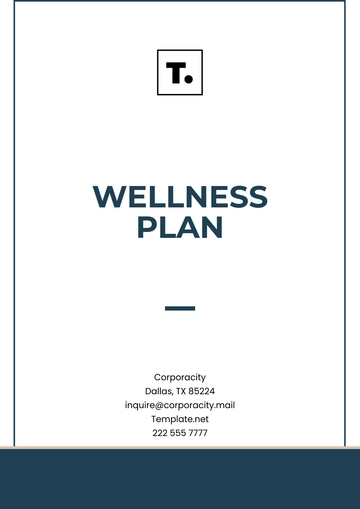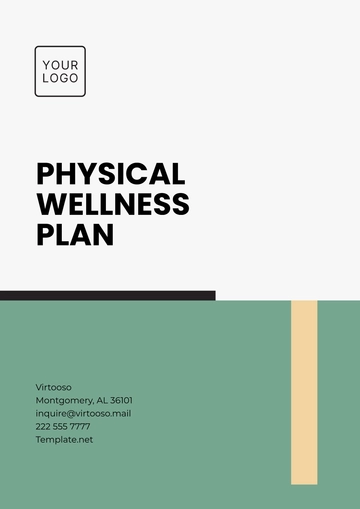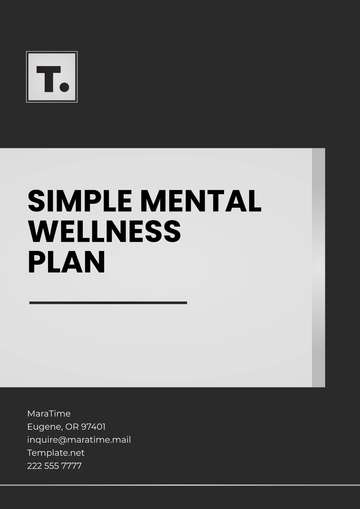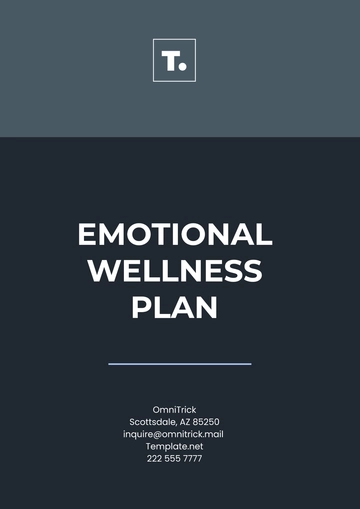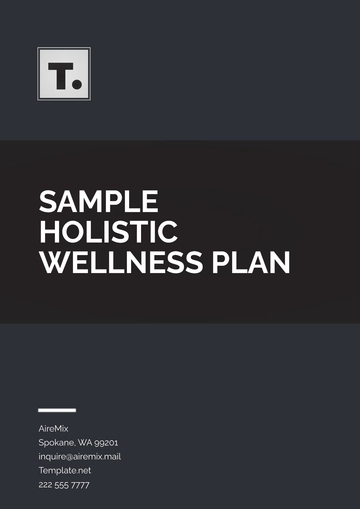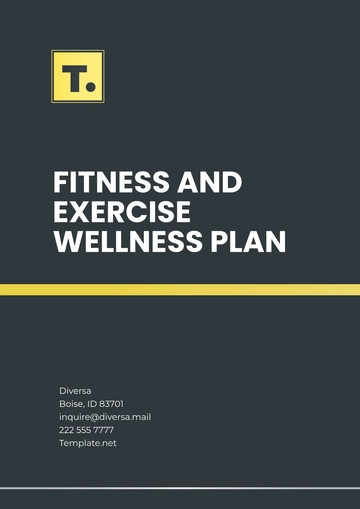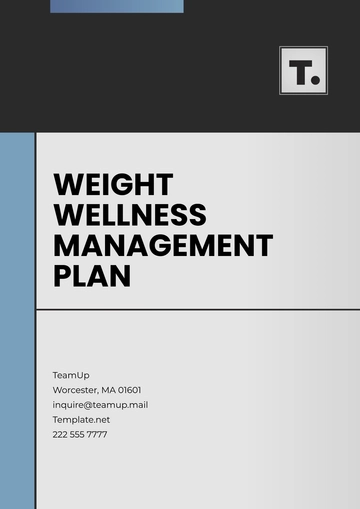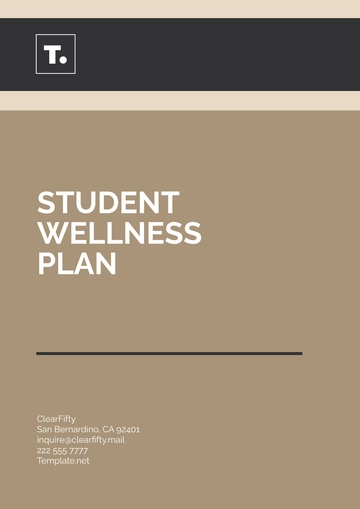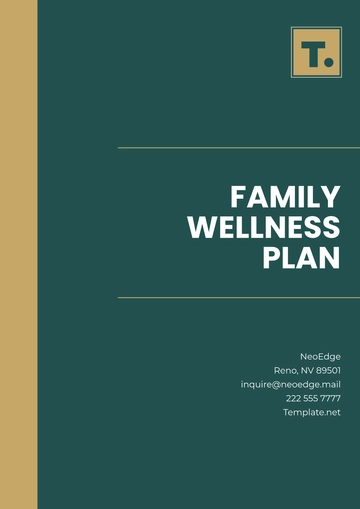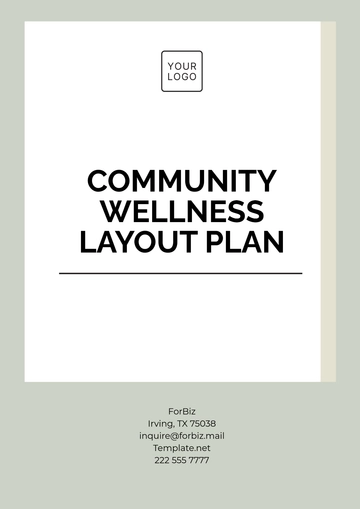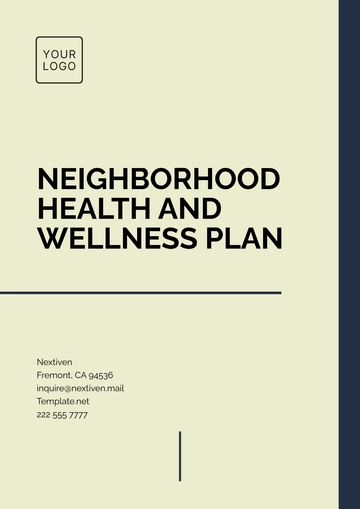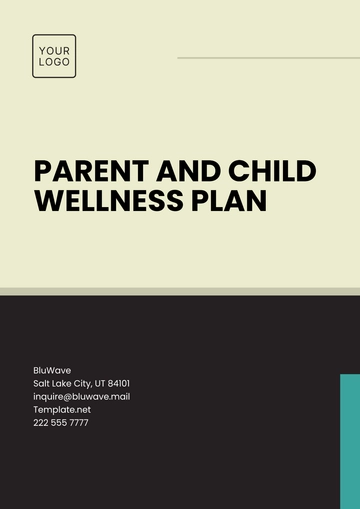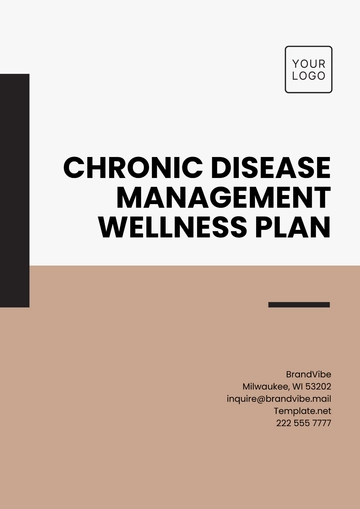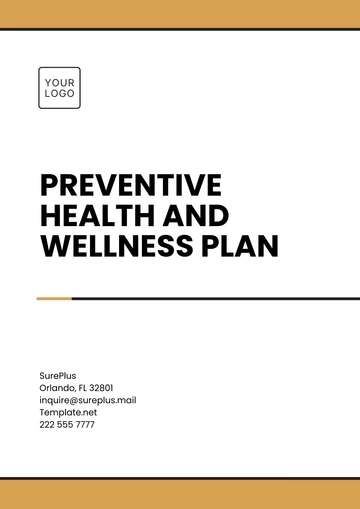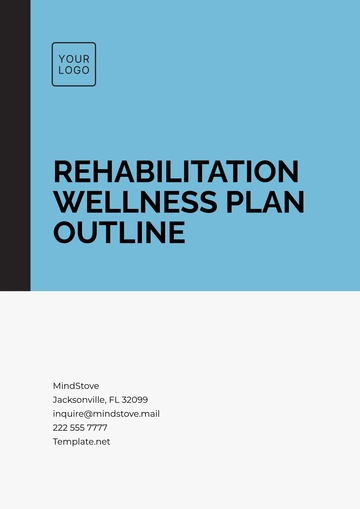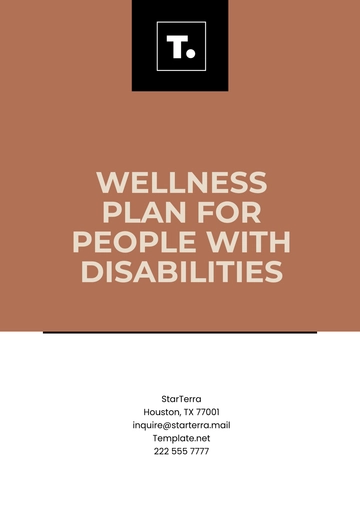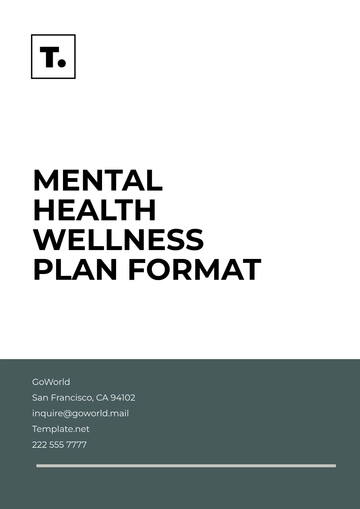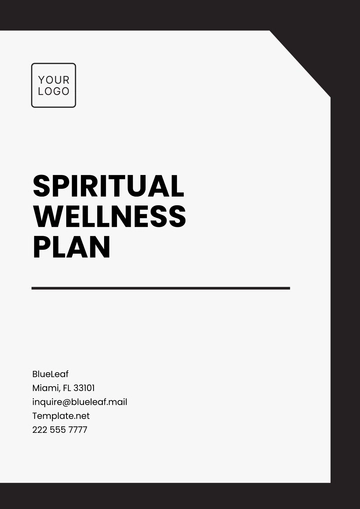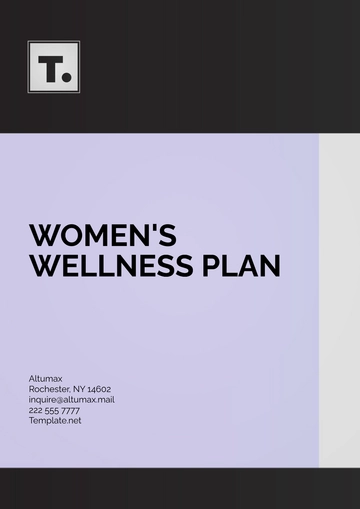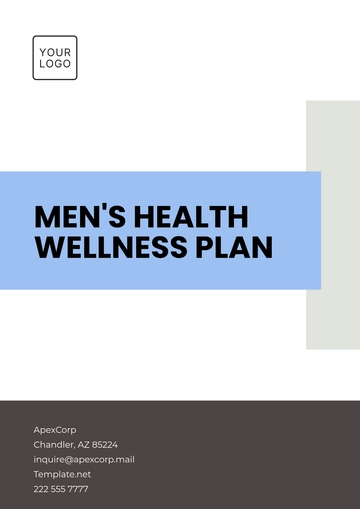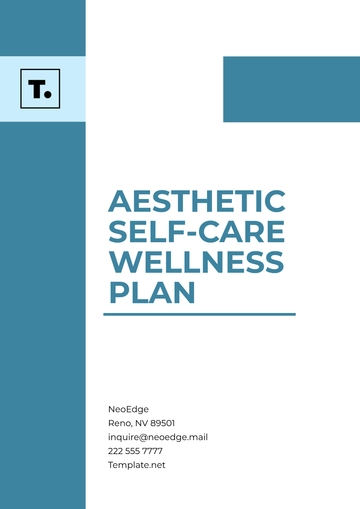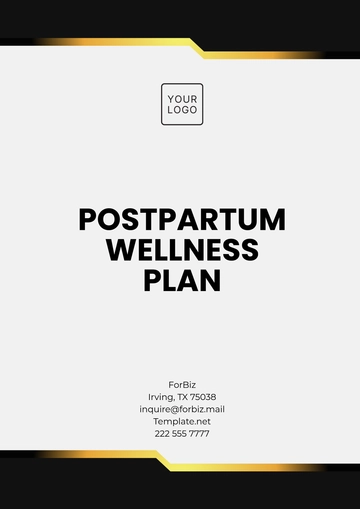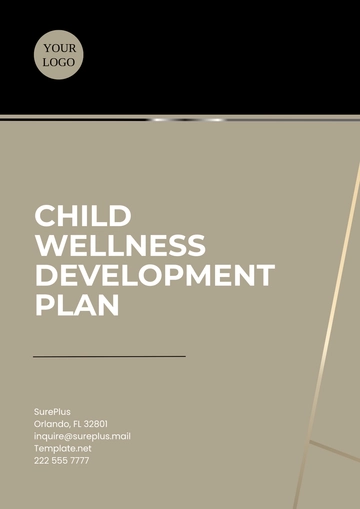Free Mental Wellness Improvement Plan

Prepared by:
[YOUR NAME]
[YOUR COMPANY NAME]
Overview
This Mental Wellness Improvement Plan is designed to enhance an individual's mental health and overall well-being. It aims to address emotional, psychological, and social challenges by setting clear goals and implementing actionable strategies. The plan encourages self-awareness, resilience, and self-care, promoting sustained improvement over time.
Goals and Objectives
1. Reduce Stress and Anxiety
Objective: To minimize stress and anxiety through regular relaxation practices and healthier coping strategies.
Measurable Outcome: Reduced frequency of anxiety episodes and improved emotional regulation as tracked in daily journal entries.
2. Improve Emotional Resilience
Objective: Strengthen emotional responses to challenges and setbacks.
Measurable Outcome: Enhanced ability to manage frustration, disappointment, and other negative emotions without emotional overwhelm.
3. Enhance Self-Care Practices
Objective: Integrate regular self-care routines that promote physical and mental health.
Measurable Outcome: Consistent engagement in self-care activities such as exercise, nutrition, and sleep management.
4. Boost Mindfulness and Focus
Objective: Increase awareness of present moments to enhance mental clarity and reduce negative thought patterns.
Measurable Outcome: Regular practice of mindfulness exercises, leading to improved concentration and reduced rumination.
Action Plan
1. Stress Management Techniques
Action: Implement daily mindfulness practices, such as deep breathing exercises, meditation, or yoga.
Frequency: 10–15 minutes daily.
Resources: Guided meditation apps (e.g., Calm, Headspace), online yoga tutorials.
Support: Consult with a therapist or counselor for additional stress-reduction techniques.
2. Emotional Resilience Building
Action: Identify and challenge negative thought patterns using cognitive-behavioral techniques (CBT).
Frequency: Weekly reflection and journaling to track emotional triggers and responses.
Resources: CBT workbooks, emotional regulation apps, or counseling sessions.
Support: Peer support groups or therapy to discuss emotional responses to stress.
3. Self-Care Integration
Action: Establish a weekly self-care schedule that includes exercise, balanced nutrition, and quality sleep.
Frequency: Exercise 3-4 times a week, eat balanced meals daily, and prioritize 7–8 hours of sleep each night.
Resources: Fitness apps, meal-planning tools, sleep hygiene tips.
Support: Accountability from family, friends, or a health coach to stay committed.
4. Mindfulness and Focus Practices
Action: Engage in daily mindfulness practices, such as mindful walking or journaling.
Frequency: 10–20 minutes daily.
Resources: Mindfulness apps (e.g., Insight Timer), mindfulness courses or workshops.
Support: Support from a mindfulness coach or group sessions to enhance the practice.
Monitoring Progress
1. Weekly Check-Ins
Track daily habits and progress through journaling or using a tracking app.
Assess improvements in mood, stress levels, and emotional responses.
2. Monthly Review
Review overall well-being, identify successes and challenges, and adjust goals or actions as needed.
3. Therapeutic Support
Meet with a counselor or therapist once a month for professional guidance and feedback.
Resources
Mental Health Apps: Calm, Headspace, Insight Timer
Books: "The Power of Now" by Eckhart Tolle, "The Anxiety and Phobia Workbook" by Edmund J. Bourne
Therapists or Coaches: Seek professional support from licensed mental health providers for tailored guidance.
Conclusion
This Mental Wellness Improvement Plan is a comprehensive, actionable strategy for promoting mental well-being. Through regular practice of mindfulness, emotional resilience, and self-care, individuals can build a strong foundation for long-term mental wellness. Progress will be monitored and adjusted as necessary to ensure sustained improvement and personal growth.
- 100% Customizable, free editor
- Access 1 Million+ Templates, photo’s & graphics
- Download or share as a template
- Click and replace photos, graphics, text, backgrounds
- Resize, crop, AI write & more
- Access advanced editor
The Mental Wellness Improvement Plan Template from Template.net is fully editable and customizable, designed to support your mental health journey. Tailor the plan to your specific needs and goals, ensuring a personalized approach. Editable in our AI Editor Tool, this template makes it easy to track progress and enhance your overall mental well-being.
You may also like
- Finance Plan
- Construction Plan
- Sales Plan
- Development Plan
- Career Plan
- Budget Plan
- HR Plan
- Education Plan
- Transition Plan
- Work Plan
- Training Plan
- Communication Plan
- Operation Plan
- Health And Safety Plan
- Strategy Plan
- Professional Development Plan
- Advertising Plan
- Risk Management Plan
- Restaurant Plan
- School Plan
- Nursing Home Patient Care Plan
- Nursing Care Plan
- Plan Event
- Startup Plan
- Social Media Plan
- Staffing Plan
- Annual Plan
- Content Plan
- Payment Plan
- Implementation Plan
- Hotel Plan
- Workout Plan
- Accounting Plan
- Campaign Plan
- Essay Plan
- 30 60 90 Day Plan
- Research Plan
- Recruitment Plan
- 90 Day Plan
- Quarterly Plan
- Emergency Plan
- 5 Year Plan
- Gym Plan
- Personal Plan
- IT and Software Plan
- Treatment Plan
- Real Estate Plan
- Law Firm Plan
- Healthcare Plan
- Improvement Plan
- Media Plan
- 5 Year Business Plan
- Learning Plan
- Marketing Campaign Plan
- Travel Agency Plan
- Cleaning Services Plan
- Interior Design Plan
- Performance Plan
- PR Plan
- Birth Plan
- Life Plan
- SEO Plan
- Disaster Recovery Plan
- Continuity Plan
- Launch Plan
- Legal Plan
- Behavior Plan
- Performance Improvement Plan
- Salon Plan
- Security Plan
- Security Management Plan
- Employee Development Plan
- Quality Plan
- Service Improvement Plan
- Growth Plan
- Incident Response Plan
- Basketball Plan
- Emergency Action Plan
- Product Launch Plan
- Spa Plan
- Employee Training Plan
- Data Analysis Plan
- Employee Action Plan
- Territory Plan
- Audit Plan
- Classroom Plan
- Activity Plan
- Parenting Plan
- Care Plan
- Project Execution Plan
- Exercise Plan
- Internship Plan
- Software Development Plan
- Continuous Improvement Plan
- Leave Plan
- 90 Day Sales Plan
- Advertising Agency Plan
- Employee Transition Plan
- Smart Action Plan
- Workplace Safety Plan
- Behavior Change Plan
- Contingency Plan
- Continuity of Operations Plan
- Health Plan
- Quality Control Plan
- Self Plan
- Sports Development Plan
- Change Management Plan
- Ecommerce Plan
- Personal Financial Plan
- Process Improvement Plan
- 30-60-90 Day Sales Plan
- Crisis Management Plan
- Engagement Plan
- Execution Plan
- Pandemic Plan
- Quality Assurance Plan
- Service Continuity Plan
- Agile Project Plan
- Fundraising Plan
- Job Transition Plan
- Asset Maintenance Plan
- Maintenance Plan
- Software Test Plan
- Staff Training and Development Plan
- 3 Year Plan
- Brand Activation Plan
- Release Plan
- Resource Plan
- Risk Mitigation Plan
- Teacher Plan
- 30 60 90 Day Plan for New Manager
- Food Safety Plan
- Food Truck Plan
- Hiring Plan
- Quality Management Plan
- Wellness Plan
- Behavior Intervention Plan
- Bonus Plan
- Investment Plan
- Maternity Leave Plan
- Pandemic Response Plan
- Succession Planning
- Coaching Plan
- Configuration Management Plan
- Remote Work Plan
- Self Care Plan
- Teaching Plan
- 100-Day Plan
- HACCP Plan
- Student Plan
- Sustainability Plan
- 30 60 90 Day Plan for Interview
- Access Plan
- Site Specific Safety Plan
